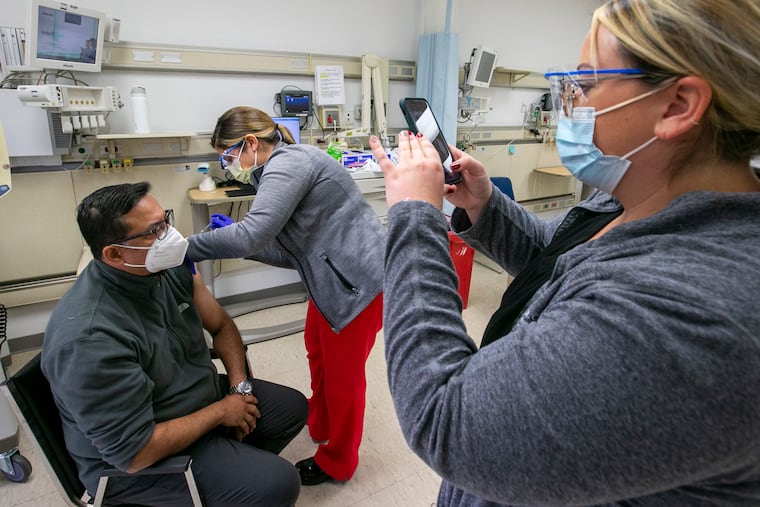St. Christopher’s doctors treat Philly’s youngest COVID-19 patients — and jump at the chance to get vaccinated
About 1,000 children have been treated at St. Christopher’s for COVID since the pandemic began.

For the physicians and nurses at St. Christopher’s Hospital for Children — who treat some of the city’s youngest coronavirus patients — the choice to receive the coronavirus vaccine was an easy one.
“I tell people, if I could be the first in line to get it, I would be,” said Oge Menkiti, a neonatologist who in the last few weeks has been fielding questions from parents about the vaccine — Is it safe? Will he get one himself?
Though the coronavirus is rare in children, and complications even rarer, Menkiti knows firsthand how dangerous the virus can be if a child does develop a serious case. He has cared for some of St. Christopher’s sickest COVID-19 patients, overseeing the team that handles a process called extracorporeal membrane oxygenation (ECMO) — an external lung that adds oxygen to the blood.
“We see the most severe COVID patients, and they’re scared — they’re really scared,” he said. “Parents are obviously terrified and scared to death. And if the kid is suffering from severe COVID, then maybe a sibling, or a parent in the house is also suffering.”
About 1,000 children have been treated at St. Christopher’s for COVID-19 since the pandemic began; 140 needed to be hospitalized, and two were so ill they required ECMO. The hospital has also treated 25 children suffering from multisystem inflammatory syndrome (MIS-C), a condition associated with COVID-19. There have been no fatalities, hospital officials said.
But as the virus has surged in the region, positivity rates have been climbing even at St. Christopher’s — rising from 1% to 2% in September to 5% and then 15% in mid-October. For the last few months, the rate has hovered around 16% to 17%, and this week dropped to 12%, hospital officials said. Ten children were being treated at the hospital on Thursday as vaccines were distributed.
That’s why it’s imperative doctors and nurses get the vaccine — not only to protect patients, but to protect staff and their own families as well, Menkiti said.
As it turned out, Menkiti was nearly first in line to receive the vaccine. On Thursday morning, his colleague Ajit Mammen, the hospital’s chief of critical care, beat him by a few hours, getting the hospital’s first-ever dose of the Pfizer-NioNTech vaccine as he came off a night shift.
“It’s an honor,” Mammen said.
Mammen, like Menkiti, has spent the last months treating children with serious COVID-19 cases. Parents on his shifts are rarely skeptical about the vaccine: “They’ve seen what this disease can do,” he said. Their questions are mostly centered [on] when they can get vaccinated themselves.
Both physicians said it’s important that residents of the neighborhoods that St. Christopher’s serves — largely a community of color — see their health care providers getting inoculated.
Decades of mistreatment and neglect in health care systems has made some people of color, especially Black Americans, wary of the new vaccine. At the same time, those same health disparities mean people of color are at a higher risk of catching the coronavirus and developing severe complications.
Those disparities aren’t limited to adults, either: a recent nationwide study showed Black, Hispanic, and Asian children are more likely to contract severe versions of COVID-19.
“We spend a tremendous amount of time communicating with patients about the importance of the vaccine,” said Ingrid McGovern, the hospital’s chief nursing officer. “Providers getting vaccinated is a huge step. We’re role models.”
St. Christopher’s received 185 doses of the vaccine on Tuesday, and expects to receive another 185 on Friday. By Monday, they will have given the first of two shots to 370 hospital staffers, McGovern said. The hospital has developed a system of tiers to distribute the vaccine: workers in high-risk areas like the emergency department and COVID-19 units will be vaccinated first, followed by lower-risk employees.
“Interest is exceptionally high,” McGovern said.
Menkiti and Mammen said their lives won’t change overnight because of the vaccine: Until more people get it, they must still wear masks and practice social distancing. But some of their own anxiety working during a pandemic, weighing the risks of contracting COVID-19, or passing it on to family members, will ease, they said.
“It couldn’t have come soon enough,” Menkiti said.